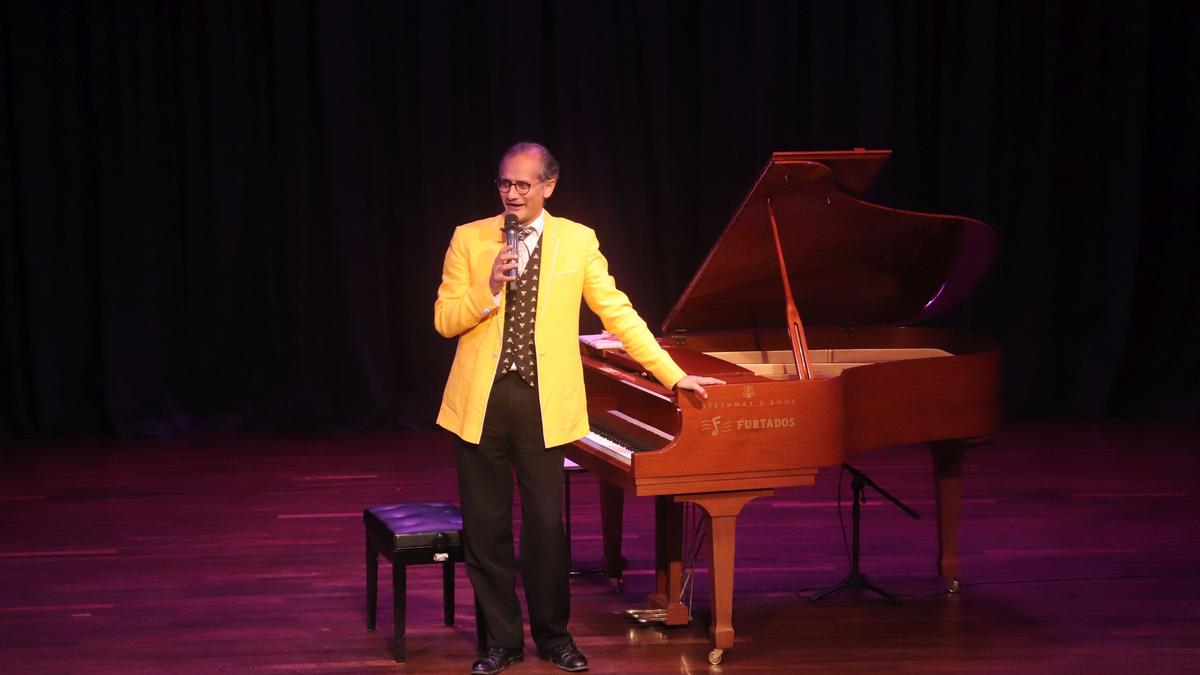A painter working in solitude, ; a theatre director steering a bunch of actors in a play-process; a chef transforming a simple dish into something exotic with just one ingredient — these were the imageries Karl Lutchmayer’s piano playing conjured up in one’s mind. His lecture-recital performed at Bangalore International Centre (BIC) was themed around the nocturnal, but Karl’s musical storytelling covered an emotional range that allowed for independent interpretations too.
Diverse styles
Karl introduced each of the chosen composition, mostlyfrom the Romantic and Modernist eras of Western classical music. From “religious ecstasy” and “gothic horror” to tender reminiscences, the music wove together diverse textures of the night, offering reflective, hopeful, serene and scary scenarios — all encompassed in his music.
‘Notturno’, by Norwegian composer Edvard Grieg, opened the concert to a meditative space, accelerating towards the end into the song of a nightingale. ‘Three Intermezzi’, the second piece was not any “gentle lullaby” but “a lullaby for a bachelor,” Karl said, while speaking of how the German composer, Johannes Brahms, had written it in his twilight years when he thought he was well past writing any more music.
Interesting nuggets
Hungarian composer Franz Liszt’s ‘Benediction de Dieu dans la Solitude’, delved into the milestones and challenges along a spiritual path. The pauses, packed with questions that might accompany such a quest, led to music suggestive of a church. Liszt’s style of working led him to invent his “job as a touring musician and teacher,” shared Karl. Nuggets such as these brought both the musician and the music alive for the audience.
Karl introduced each of the chosen compositions
| Photo Credit:
Special Arrangement
Another Hungarian composer Bela Bartok’s ‘The Night’s Music’ enlivened a “forests of sounds,” describing “bugs, frogs, raindrops,” on a rainy night. Bartok’s music, Karl explained, is marked by experiences of a country life he favoured over urban living. The free-floating sounds, emanating from this piece, belied the notated music that Karl read while playing. Remarkably, this was the only piece that Karl used sheet music for. The last piece, ‘Gaspard de la Nuit’, by French composer Maurice Ravel, strung together three smaller pieces that were marked by neo-gothic horror, surprise (not pleasant ones) and strangeness that included a body swinging in a high tower, a rope dripping blood, insects, a spinning hobgoblin and a siren whose overture of love meets failure.
Karl said: “’Tales of the Night’ explores the human relationship with the night. There’s wistfulness and memory, peace and spirituality, as well as heartache and, of course, the spookier side of imagination.” While studying doctorate at Cambridge, Karl examined “more intimate sound worlds” and found himself ”drawn” to the music of Brahms. This was the starting point of the work that later “coalesced around three different, major works by Brahms, Liszt and Ravel.” He anticipates that he will be playing music of “extraordinary, young composers” from across India the next year, especially the works of Utsyo Chakraborty.
Karl has performed across India since the age of 15 and currently resides in Goa
| Photo Credit:
Special Arrangement
Born and educated in Britain, Karl has performed across India since the age of 15 and currently resides in Goa. He highlights the key differences between the Western classical music scene in Britain and India: “Here, it is fairly young and expanding, whereas, in Britain, it seems to be atrophying. Most teachers here have a waiting list, and there are increasing opportunities for musicians in this genre, though music education here is not as developed as it is there.”
Karl also said that “for a proactive and entrepreneurial musician, India is a land of opportunities .” He pointed out that “of the nine lakh engineers graduating each year, only about 42% get engineering jobs, whereas, music teachers with a grade-8 certificate, which is the equivalent of the 12th standard Board exams, earn very well and have waiting lists.” A seasoned performing musician, who is as experienced and passionate about teaching, Karl said that he would I encourage music students not to take back-up degrees, but to follow their passion wholly as India is probably the only place on earth where demand outstrips supply for Western music.”
Published – August 02, 2025 04:07 pm IST
